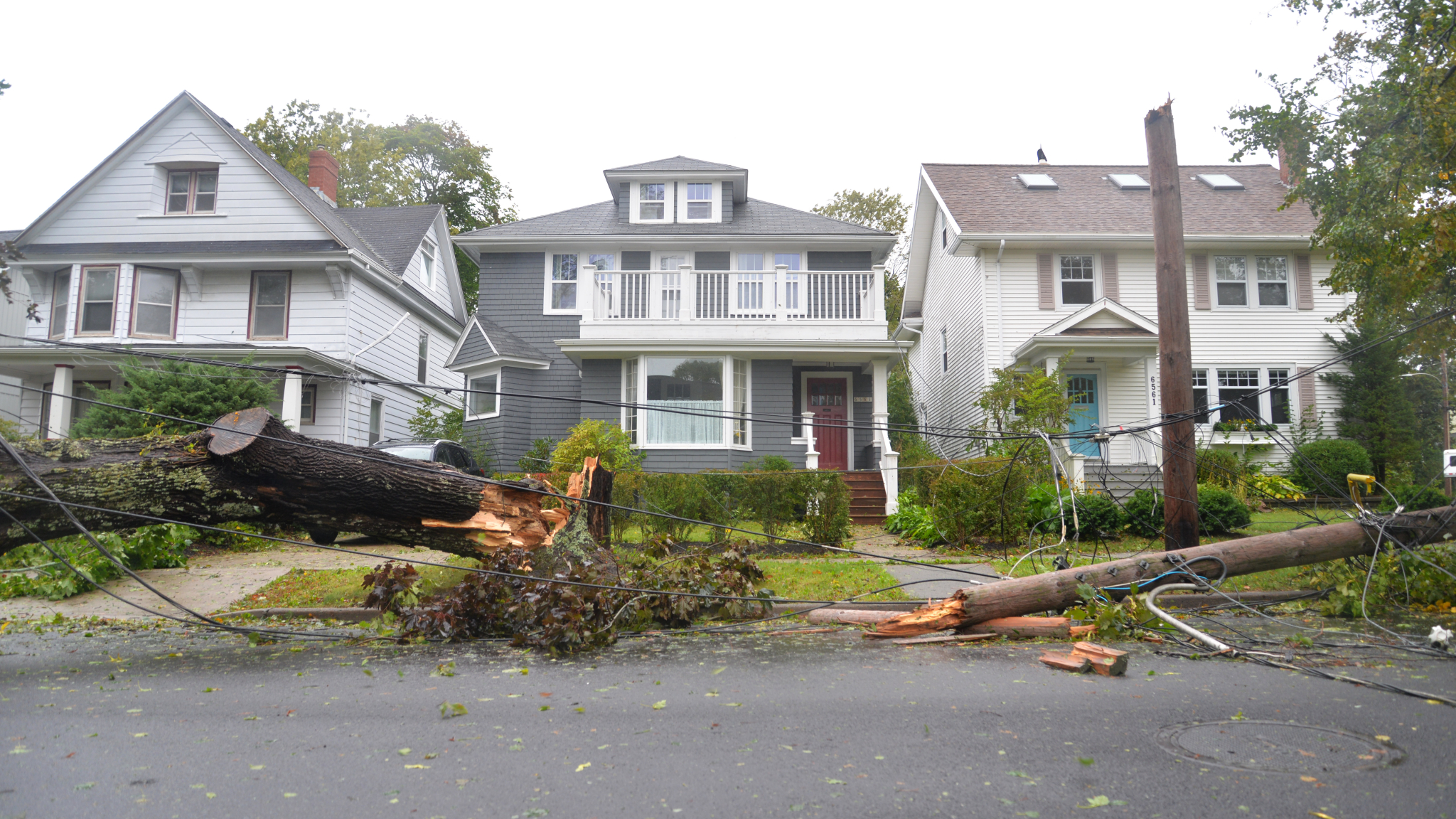As Hurricane Fiona moved out of the Atlantic provinces on Saturday, residents in the region’s largest city emerged from their homes to inspect the damage.
While Halifax was spared the worst of Fiona’s fury, the storm had nonetheless caused hundreds of thousands of people to lose power across the province, including more than a hundred thousand in the capital. Many roads were blocked by fallen trees, and pedestrians and power crews wove their way under downed poles and lines that had been flagged with grocery bags and plastic leis.
Transit services was suspended in the municipality, and for many residents, cellular services was unavailable or unreliable.
“[Halifax Regional Municipality] has been hit hard, we have downed power lines, trees down across the municipality, obviously connectivity issues,” said Halifax Mayor Mike Savage in a briefing Saturday afternoon. “We are asking people to be mindful of those who are in more difficult places than themselves.”
In an evacuation center housed in a Halifax sports centre, several dozen people sat on the floor, or at tables, their hands around cups of coffee and instant noodles.
Colin Tremills had arrived at the shelter at 4:30 in the morning; he’d been awoken by firefighters in the middle of the night, after the wind had blown over the chimney of his Dartmouth apartment building and sent it crashing through the structure. “It was terrifying,” he said. “We just grabbed whatever we could and got out as quickly as possible.”
Tremills said it was a miracle no one had been hurt; he’d heard one his neighbors had been sitting at his table only minutes before bricks from the chimney came crashing through the ceiling in that spot. “He’s lucky to be alive,” Tremills said.
Still, evacuated residents were fatigued and stressed. Firefighters had allowed people back in the building to pick up medication but nothing else. As a result, he was at the shelter with few possessions, and no sense of where he was going to stay in the short term. He hoped that the landlord would provide temporary accommodation, but he was worried what would happen if the building was deemed unsound. “Everyone is worried because in Halifax there’s a housing shortage,” he said. “People are looking at paying more [in rent]- and that’s if you can find an apartment.”
Downed trees were also a significant source of damage throughout the city. On a major street in Halifax, Sergei Shirokov stood on the sidewalk talking to a neighbor, a saw in one hand and clippers in the other. His fence had blown over in the night, and broken branches littered the sidewalk, but he counted himself lucky; the large tree limb hanging over his house had not come down. “So far so good,” he said.
Other neighbors were not so fortunate; a few houses away, a large tree had been uprooted and blown over, crushing an SUV. Trees and tree limbs had also fallen on houses throughout the neighborhood, including the house next to Shirokov’s; the neighborhood was filled with the sound of generators and chain saws.
Shirokov’s neighbor Steve remarked that the extent of the damage in their neighborhood seemed similar to that caused by Hurricane Juan in 2003, but added that for many, the extent was not the primary concern.
“For the poor people who happen to be unlucky enough, it doesn’t matter if it was the only tree in the whole city that went down, if it went down on their roof, it’s a problem.”
On a Halifax street blocked with downed trees and wires, Maeve Boyne and her family paused; they’d just walked down to check on a boat they had moored in Halifax’s Northwest arm (their boat was fine, but they saw at least one other boat that had been tossed up on shore).Their arms were filled with hydrangea; they’d been blowing down the street like tumbleweeds, Boyne said.
In the Saturday afternoon briefing, officials said that Fiona had proven as damaging as projected, and for Boyne, she’d awoken to damage as bad as she’d feared. “People kept telling me, oh it’s not going to be that bad, and I was like, I’m pretty sure it’s supposed to hit Nova Scotia pretty hard.”
On Saturday, recovery from that hit was only just beginning; Nova Scotians were told by officials that given the severity of the storm, damage assessment and power restoration could take days. The province had requested federal disaster assistance and support from the military to help with long and short term response.
Mindful of the fact that other regions had not been as lucky as Halifax, Mayor Mike Savage said the city was also prepared to offer assistance.
“We have had hardship, it was a wild night in Halifax,” he said. “But when I see the images of Port aux Basques, Cape Breton, PEI, I just want to say that our hearts are with you, and anything we can do to help, we will.”



Comments